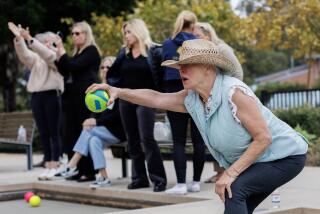Everyone knows about spit and polish and...
- Share via
Everyone knows about spit and polish and the spit shine . . . but for 50 years, the Spit and Argue Club was almost as famous in these parts.
From the end of World War I until the beginning of the Vietnam War, the Spit and Argue--one of the only city-sponsored soapboxes in the nation--gathered in the shadow of the Pike amusement park in Long Beach.
Mostly it was a lot of jawboning. Once, it spawned an idea--Social Security.
In 1918, retired farmers, mostly Iowans, gathered casually near the Pike every day to discuss crops and weather and memories of home. So many Iowans had come to Long Beach that local wits named the city “Iowa by the Sea” and referred to it as Iowa’s only saltwater port.
Their afternoon discussions became so loud and intense that merchants complained, and the city moved the group to the Pine Avenue Pier. That’s where they stayed for 16 years. While London has Hyde Park Corner, Long Beach had the Spit and Argue crowd--seven days a week, four hours a day, engaging small crowds or large.
It was not all hot air at the Spit and Argue Club.
Long Beach physician Francis Townsend’s idea of a national pension plan of $200 a month for citizens older than 60 got its start at one of the club meetings.
In 1934, Townsend’s plan spawned a political movement that spurred the creation of the Social Security Act, and the Pine Avenue Pier succumbed to the sea during a devastating storm.
Undaunted, the group moved farther down the beach near the new Rainbow Pier, where it regularly blocked traffic. On Sundays, a crowd of a 1,000 or more would gather to hear religious speakers.
By 1935, the club moved once again, only a few feet away, to a platform adjacent to Rainbow Pier, between Cedar and Pacific avenues. There, the Long Beach Department of Parks and Recreation gave the club its first official home, building a 3,200-square-foot platform, with benches, knotholes for spitters and barrels full of pieces of wood for whittlers. To make the club sound more dignified, the city also changed the club’s name to the University by the Sea.
Formal rules were drawn up banning profanity, drinking and the wearing of bathing suits. Otherwise, membership was restricted only to anyone who could sit, stand, listen or talk. Speakers were allowed 10 minutes each and usually came equipped with Bibles, encyclopedias and quick wits.
When each speaker finished, a member would hold up a slate that read “10 more minutes” on one side and “end of time” on the other side. A show of hands would determine whether the orator could continue or not. One member would always use his 10 minutes to give a flute solo. He never got the “10 more minutes” sign.
During summer months, when out-of-towners flocked to the pier and to the club, a police officer was assigned as a precautionary measure in case a dispute got a little overheated.
Every November, the members would elect a committee of five, by secret ballot, to keep things in hand by enforcing the rules.
Harry Brandt, a retired building contractor from Seattle, with white hair, mustache and goatee, was a senior member of the club for more than 20 years.
Brandt raised the American flag on the platform every day at 1:30 p.m. and hauled it down at 5:30 p.m., the club’s hours. Brandt once said, “I never made a public speech in my life before I was 67. Then I got mixed up in this club and I’ve been here ever since.”
And in November, 1950, a few days before Election Day, then-Lt. Gov. Goodwin Knight thought he’d talk up a few votes in his race for governor by dropping by the university. But the wind carried his efforts out to sea. After he was elected, he sent the club a loudspeaker as a gift.
One of the regulars was a tall, white-haired man with a stiff leg who would often get things started by saying, “I’m an old-fashioned radical. You know me, I’m not one of your Reds.” Whatever his politics, the crowd loved him. Some would jump to their feet and give him a fight on every point he made, just for the sake of argument.
Another, a diminutive man in his 80s, often dropped by for his 10 minutes and smiled benignly and talked quietly about suicides, about a certain movie actress and the man who jumped from a window because of her. “What the world needs,” he said, “is internal quietude. Peace. We’ve too much of a world of grab and greed.”
Another regular always worried about overpopulation. “There are too many babies,” he said. “People had better think before they procreate.”
Whoever spoke, the crowd would bristle, shout, laugh, argue and grow languid in the sun. Along the beach, sunbathers occasionally climbed the platform railing to listen a moment before they dropped back onto the sand.
Rainbow Pier, which curved in a semicircle from Linden to Pine avenues, was demolished in 1966 and the Spit and Argue Club went quietly along with it.
More to Read
Sign up for Essential California
The most important California stories and recommendations in your inbox every morning.
You may occasionally receive promotional content from the Los Angeles Times.









